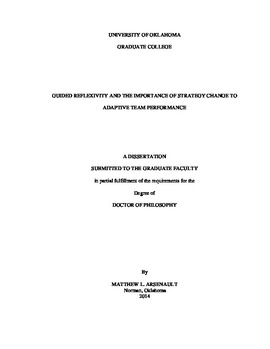| dc.contributor.advisor | Day, Eric | |
| dc.contributor.author | Arsenault, Matthew | |
| dc.date.accessioned | 2014-05-12T13:39:09Z | |
| dc.date.available | 2014-05-12T13:39:09Z | |
| dc.date.issued | 2014-05-09 | |
| dc.identifier.uri | https://hdl.handle.net/11244/10390 | |
| dc.description.abstract | Theories describing team adaptive performance provide insight into the mechanisms that facilitate adaptive performance; however, these theories have yet to link these mechanisms to the nature of the novel demands teams face. The present study examined the effects of team reflexivity content (i.e., taskwork, teamwork, and general metacognition), strategy stability and change, and team processes on performance when teams faced routine and novel performance demands. Using a command-and-control style videogame, 97 three-person teams performed three missions characterized by routine performance demands and two missions each characterized by a different type of novel performance demands—apparent versus subtle. Results showed that taskwork reflexivity had an indirect effect on adaptive performance through routine performance when teams faced either type of novel performance demands. General metacognition reflexivity had a direct effect on adaptive performance when the novel demands were apparent. Contrary to expectations, neither strategy change nor teamwork processes were beneficial to adaptive performance. Rather, routine performance accounted for the most variability in adaptive performance across both apparent and subtle novel demands. Results are discussed with respect to the importance of considering the need for theory and research on adaptive team performance that distinguish different types of novel performance demands and underscores the importance of task proficiency in adaptive performance. | en_US |
| dc.language | en_US | en_US |
| dc.subject | Psychology, Industrial. | en_US |
| dc.title | Guided Reflexivity and the Importance of Strategy Change to Adaptive Team Performance | en_US |
| dc.contributor.committeeMember | Bolino, Mark | |
| dc.contributor.committeeMember | Connelly, Shane | |
| dc.contributor.committeeMember | Mendoza, Jorge | |
| dc.contributor.committeeMember | Terry, Robert | |
| dc.date.manuscript | 2014-05 | |
| dc.thesis.degree | Ph.D. | en_US |
| ou.group | College of Arts and Sciences::Department of Psychology | |
